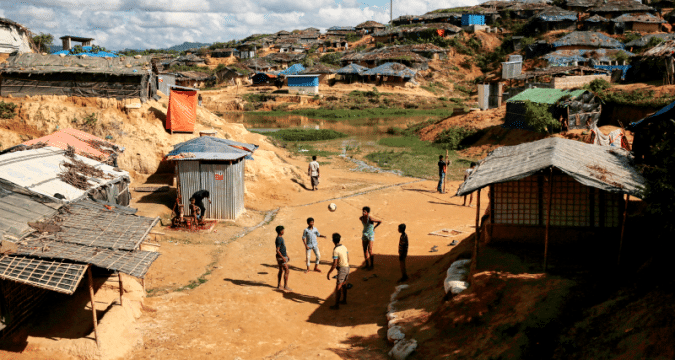
DHAKA (UCAN): Afzal Rahman and his family have been passing fearful days and nights since they were alerted by aid workers to the deadly Covid-19 coronavirus wreaking globhavoc globally.
The 39-year-old Rahman is a Rohingya refugee and head of a seven-member family living in the overcrowded and largely unsanitary Balukhali refugee camp in Cox’s Bazar, in southeast Bangladesh.
The camp accommodates more than 200,000 Rohingya Muslims from Myanmar’s Rakhine state. It is one of some 30 squalid, makeshift refugee camps in Cox’s Bazar sheltering about a million Rohingya who fled brutal persecution in their homeland.
“Very few people here are aware of this deadly virus. There is little preparation and no support system for people to maintain social distance, hygiene and protection. A sizable number of people are elderly and children who are mostly suffering from malnutrition. Coronavirus infection will cause a massive humanitarian disaster,” Rahman explained.
The former schoolteacher from Maungdaw, in Rakhine, pointed out that shelters in the camp are very close to each other and families have up to 12 members, making the community vulnerable to any communicable disease.
“Community leaders and educated people are trying to raise awareness among people and convince them to follow guidelines from Bangladesh’s government and charities to stay safe from the virus,” Rahman added.
Forty-three-year-old Muhammad Ali heads a 10-member family in Kutupalong camp, the largest refugee shelter in Cox’s Bazar with more than 400,000 residents. He said officials from the state and non-government organisations have visited camps frequently in recent days and told people to take measures to stay safe from the virus.
“Not all know how the deadly the virus is. But we have been told not to go outside, wash hands with soap and pray inside shelters instead of mosques. While our family is following the instructions, I don’t know about others,” Ali recounted.
He said the camp has many elderly and children who are most vulnerable to the virus.
“It is difficult to control children as they don’t want to stay home. They want to go outside to roam around and play,” he said.
Globally, Covid-19 has infected nearly 532,000 people in 197 countries and killed more than 24,000, according to World Health Organisation (WHO) figures on March 27.
Bangladesh has recorded 44 coronavirus infections and five deaths.
Despite an initial slow response, the government has shut down education institutes, locked down some areas, declared a 10-day general holiday and banned public gatherings and public transport to contain the spread of the virus.
Precautionary measures have also been taken to stop the entry of the virus into refugee camps, said Mahbub Alam Talukdar, head of the state-run Refugee Relief and Repatriation Commission.
“We have closed schools and child-friendly centres, banned entry of foreign visitors without a 14-day quarantine period, distributed leaflets in Burmese and English with WHO guidelines for coronavirus and put restrictions on public gatherings,” Talukdar said.
He said that two Rohingya families who came to the camp from abroad have been put in isolation in UNHCR (United Nations High Commissioner for Refugees ) transit camps, while about 200 beds in hospitals are ready to treat any coronavirus.
Only emergency services such as food, health and law enforcement have been fully operational and all other activities have been restricted, Talukdar added.
Pintu William Gomes, head of Rohingya response at Caritas Bangladesh, said that there is no alternative to extra protection to save refugee camps from the pandemic.
“Since infections and deaths from the virus have been recorded in Bangladesh, Rohingya refugees remain vulnerable. The government and the Inter-Sector Coordination Group for aid agencies have been working together to stop entry and transmission of the virus into the camps,” Gomes said.
“Caritas has been running an awareness campaign in its operational areas in the camps, although all other activities except emergency services have been suspended,” he said, adding that no guest or visitor from outside has been allowed to visit the camps in recent weeks as part of precautions.
“Rohingya are physically and psychologically weaker than Bangladeshi people. They deserve our sympathy and support to stay away from a looming crisis,” Gomes added.








